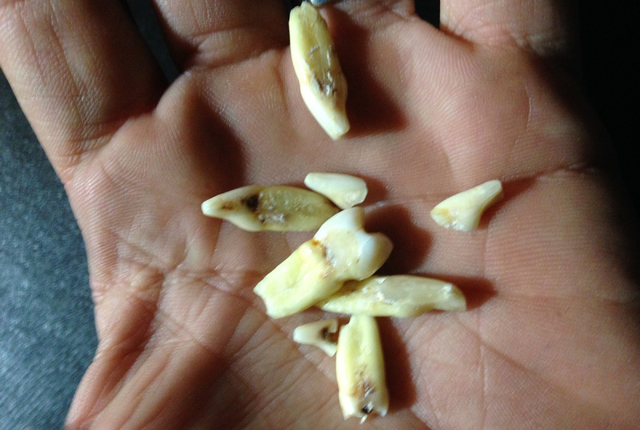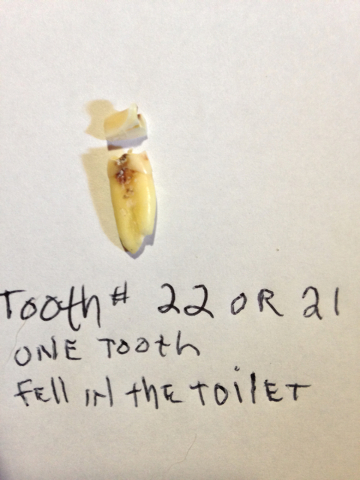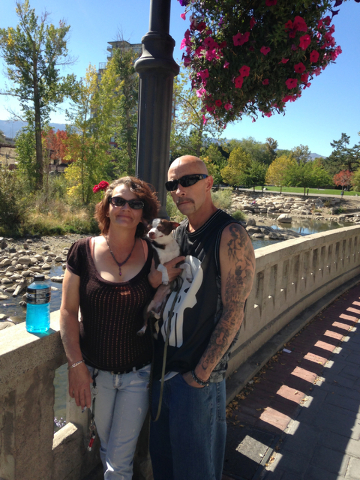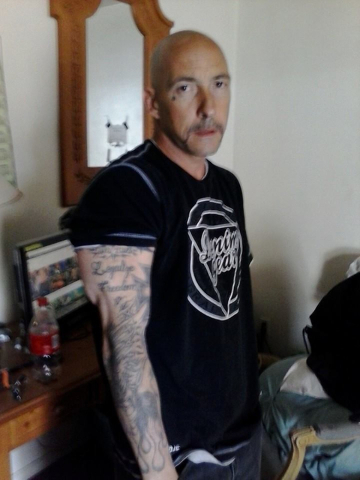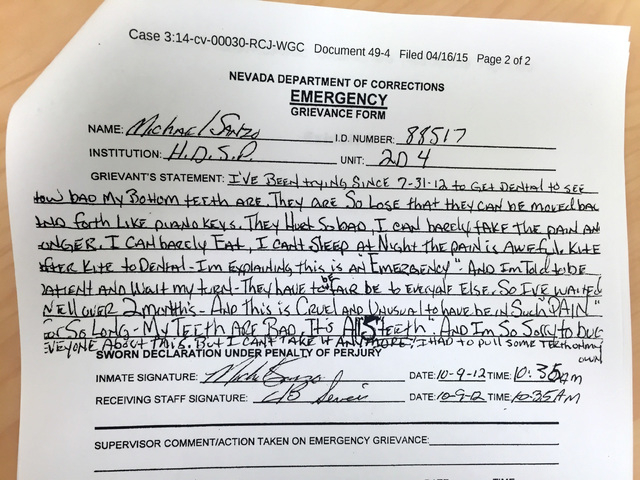Claim: Guards ignored cries of pain so Nevada inmate removed his own teeth
Michael Sanzo’s pleas for help are documented on his numerous requests for medical attention at High Desert State Prison, including an emergency grievance form he filled out on the morning of Oct. 9, 2012.
On that date, Sanzo again sought treatment for his bad bottom teeth, which were moving back and forth “like piano keys.”
“I can barely take the pain any longer,” the inmate wrote. “I can barely eat, I can’t sleep at night.”
But for Sanzo, the answer was always the same: Wait your turn.
So he took matters into his own hands, according to a lawsuit he later filed against Nevada prison officials.
“Due to the unbearable pain that the plaintiff endured, despite his repeated and desperate cries for help, the plaintiff was forced to smash out his teeth by punching himself in the face, other macabre means, and pulling the teeth out,” according to an amended complaint filed April 16.
The document claims Sanzo, now 47, suffered for eight months while in solitary confinement at the prison near Indian Springs. It claims he removed a total of six teeth and even attempted suicide by asphyxiation with his bed sheet.
According to the lawsuit, the pain was so extreme in September and October 2012 that Sanzo could not sleep, had trouble eating, continued to suffer from feverish sweats and “had lost complete control over his bowel movements.”
“I was in there begging for my life,” Sanzo told the Las Vegas Review-Journal in a recent phone interview. He was released from prison in March 2014 and now lives in Reno.
Affidavits from two fellow inmates support his claims. One man reported being “haunted” by Sanzo’s screams of pain and “ghostly moans.”
“They would not even give him a aspirin for his pain,” another wrote.
The lawsuit accuses prison officials of violating Sanzo’s Eighth Amendment right to be free from cruel and unusual punishment by depriving him of treatment for his infected and abscessed gums and teeth.
Within days of his transfer to Ely State Prison in November 2012, Sanzo “was able to see a dental professional to have his needs addressed,” according to his lawsuit.
“I got some nice choppers now,” Sanzo said during the recent interview. “I got false teeth.”
Deputy Attorney General Benjamin Johnson, who represents the defendants in the case, said only that the attorney general’s policy is not to comment on pending litigation.
But Johnson recently filed a motion for summary judgment, asking for a ruling in favor of the defendants before the case goes to trial. According to the motion, Sanzo was seen by a nurse or doctor “at least four times” between June 29, 2012, and Oct. 4, 2012.
“Several times plaintiff was seen by medical and only complained of scalp issues with no mention of dental problems,” Johnson wrote.
A jury trial is scheduled for June 29 in Reno.
PRISONERS FACE ‘INHERENT BIAS’
Sanzo relied on a “jailhouse lawyer” — a prisoner who assists other inmates with legal matters — to help open his civil case in January 2014.
“I just want to be heard,” Sanzo told the Review-Journal.
He said he contacted hundreds of licensed attorneys after his release from prison, but no one wanted to represent him until he found Reno attorney Luke Busby, who took up the case in April 2014 and filed an amended complaint. Busby, who has been in private practice since 2010, said this is the first time he has represented a prisoner in a civil case.
“I don’t as a matter of course take these cases,” he said.
Busby said the Prison Litigation Reform Act, a 1996 federal law, was designed to reduce frivolous lawsuits filed by prisoners but also reduced the potential for the recovery of attorney fees that are typically available in other types of civil rights cases.
“I don’t think there are many attorneys who will take these kinds of cases, because it’s not a good business proposition,” Busby said.
He said such cases also are difficult to win “because of the inherent bias people have against prisoners.”
“The perception in the public is prisoners are often suing because they got the wrong color of toothbrush or something like that,” the lawyer said.
But inhibiting the ability of prisoners to bring civil rights cases creates “a lack of accountability for serious civil rights violations when they occur,” he argued.
Busby said he decided to meet Sanzo “on a whim” after another lawyer sent the ex-prisoner to him.
“I felt he had a valid claim under the law,” Busby said.
He said the Eighth Amendment may not be the “most glamorous” amendment to the Constitution, “but it’s fundamental” in a civilized society and must be enforced.
“It can’t just be aspirational,” he said.
Medical care in the Nevada prison system has come under scrutiny in the past. In 2008, for example, the American Civil Liberties Union of Nevada filed a class action lawsuit against the state that contended Ely State Prison inmates were receiving inadequate medical care.
The lawsuit led to the placement of an independent monitor at the prison to ensure that medical services were being provided in a constitutional way. And the ACLU of Nevada received $325,000 in legal fees when the case settled in 2010.
Busby said Sanzo’s treatment at the Ely prison “was really pretty good.”
According to information provided by the Corrections Department, the Ely prison has about 36 medical positions and an inmate capacity of 1,183. High Desert has about 64 medical positions and an inmate capacity of 4,176.
Sanzo said he has spent a total of 18 years behind bars, and he estimates he spent 11 years of that time in solitary confinement for disciplinary reasons.
His record includes crimes such as obtaining money under false pretenses and drug trafficking. He admits he once struggled with a methamphetamine addiction but said he hasn’t used any illegal drugs for six years.
Sanzo said he received his most recent prison term — four to 10 years — after pleading guilty to possession of a stolen vehicle and possession of a controlled substance. He served more than five years of the sentence.
SLOW RESPONSE ALLEGED
According to his lawsuit, Sanzo injured his teeth in March 2012 and reported the injury to a prison nurse, “who assured him that his teeth would be taken care of shortly.”
Sanzo reported that he fell while playing basketball, but the defendants contend he was involved in a fight during yard time. The incident led to Sanzo’s placement in solitary confinement. He pleaded guilty to a charge of fighting in April 2012, according to the defense motion for summary judgment.
Records indicate that Sanzo sent his first medical “kite” — written request from an inmate — for dental treatment on July 31, 2012. It reads, “4 of my bottom teeth are ready to fall out — they are like ‘weeble wobbles’ I can’t eat barley — and I’m in bad pain — please hurry I need them pulled.”
The kite came back two days later with a stamped response from dental assistant Colette Ball: “When your name comes up on the list we’ll see you.”
Other kites received similar responses from Ball, now a defendant in the lawsuit. Bruce Bannister, medical director for the Corrections Department, also is named as a defendant.
Sanzo sent his sixth and final request on Oct. 25, 2012, when he wrote, “I have had to cry myself to sleep in such pain! I have had to pull 6 of my own teeth cause the pain is sooooo unbearable — It’s been 3 months now — please help me.”
Ball sent a handwritten response six days later. It began, “As I have explained before Mr. Sanzo you are in a lockdown unit. You are seen 1 at a time and share you (sic) time slot with 3 other lockdown units. We see everyone by order of their kite this being firm, fair, and consistant (sic).”
The note concluded, “You need to look at the big picture. A lot of inmates here.”
While Ball’s response “might sound callous,” according to the defendants’ motion for summary judgment, “it is not enough to establish deliberate indifference.”
Sanzo “cannot demonstrate that her conduct rises to the level of an Eighth Amendment violation,” the motion alleges.
According to an attached declaration from Ball, only medical staff go to the units to see inmates.
“I do not recall seeing any notation or requests from medical stating that Mr. Sanzo had an infection requiring priority treatment,” she wrote.
Sanzo said he smuggled his extracted teeth, minus one that fell in the toilet, out of prison to use as evidence in his case.
He has been “couch surfing” since his release from prison, often staying with his girlfriend or in a friend’s car, and he has struggled to maintain employment. A recent letter from his psychiatrist indicates that Sanzo suffers from bipolar disorder and post-traumatic stress disorder and “is unable to work.”
But Sanzo said he is determined not to return to prison.
“This is the longest I’ve ever been out.”
Contact Carri Geer Thevenot at cgeer@reviewjournal.com or 702-384-8710. Follow @CarriGeer on Twitter.
RELATED:
ACLU criticizes Nevada’s prisons in report
Class action OK’d for Ely prison lawsuit



